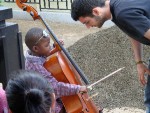Title
My trip to Arusha, Tanzania, began like so many other things these days: with a simple Google search.
Body
Toward the end of the fall 2008 semester, I had been talking to some friends about different ideas for summer outreach projects, but nothing was working out the way I had hoped. Finally I did a random search online for volunteer opportunities in Africa and found a hostel that hosted volunteers who worked at several schools and orphanages in Arusha. I took a chance and e-mailed the hostel to see if any school they work with would be interested in having an arts camp. Much to my surprise, they e-mailed back about Umoja Youth Empowerment Center, a school that would open in March 2009 to give free vocational classes to young people, ages 14 to 29. The school serves students who have dropped out of the Tanzanian school system because of overcrowded classrooms, family problems, poverty, and countless other reasons.
The schools in Tanzania are government-run, and as students progress through the system they must take various exams that determine whether or not they can continue. The exams are very difficult to pass and eliminate large numbers of students, who have been taught in overcrowded classrooms by untrained teachers. Umoja provides English classes, computer training, life skills, and a sense of community that these young people cannot attain anywhere else. Although I didn’t know exactly how amazing Umoja was when I received that first e-mail, it sounded like the perfect place to have our arts camp. Second-year cellist Patrick McGuire and I figured out a rough budget to see if it would be possible, and after deciding that we could raise the money, we began recruiting members to join our team.
We wanted the program to encompass all the arts, so we decided that our group should include representatives from the Dance, Drama, and Music Divisions. In the end, the team members were Patrick and I (Music), Evan Todd, Jordan Geiger, and Ryan O’Byrne (Drama), and Collin Baja (Dance), who graduated in 2008. We sketched out a tentative summer camp-type schedule that ran from 10 a.m. to 4 p.m. every day for two weeks, culminating in a benefit performance at a local café/cultural center to raise money for Umoja.
The next hurdle to overcome was raising the money for our $16,000 budget, which covered transportation, room and board, and supplies for the camp. We applied for a Juilliard Summer Grant, sent out donation letters to our friends and families, and put together benefit events. Because of the economic decline we worried that this would be a bad year to try to raise money, but we received an overwhelming response. We were awarded a Juilliard Summer Grant that helped pay for our plane tickets and we were approached by the Juilliard Arts Council with more support, which helped pay for room and board.
The final result of the project was more than any of us ever imagined. Working with the students was incredible—they were so open and willing to try anything we threw at them. We played a lot of games to break the ice and to help them open up. The 40 students were split up into three groups that rotated through sections. The music section was based on rhythm and song, and in one activity, students played traditional Swahili songs on small percussion instruments we brought along. The dance section worked with movement and creation through mirroring exercises and simple choreography. The drama section encouraged self-confidence through activities such as trust games and stage presence, and inspired sharing through creative writing. By the end of the program, we had helped the students create a show combining Swahili songs and stories, poems and songs the students had written, dance performances, and even a comedy routine. After the show the students didn’t want us to leave and asked to take picture after picture with us. It was hard to say goodbye after only two weeks, but we know that they are in good hands at Umoja and we are all so grateful that we had the experience to work with them. We hope that this project can continue and we remain in contact with the students, teachers, and volunteers we met to see what might grow from our connection.





